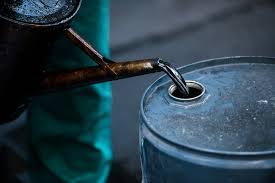As the price of crude oil at the international markets sunk further below $40 per barrel yesterday, analysts and operators in the Nigerian economy have said a sustained downward trend in the price of crude could force Nigeria to borrow more than it planned to and a possible devaluation of the naira.
President Muhammadu Buhari yesterday called an emergency closed-door meeting with key aides in charge of the economy, including those in charge of Finance and Petroleum Resources over the oil price.
Those at the meeting are minister and minister of State Finance, Budget and National Planning, Mrs Zainab Ahmed, and Prince Clement Agba; as well as the minister of State for Petroleum Resources, Chief Timipre Sylva and the governor of the Central Bank of Nigeria (CBN), Mr Godwin Emefiele and the Group Managing Director of the Nigerian National Petroleum Corporation (NNPC), Mr Mele Kyari.
The severity of the Covid-19 and its spread across the world had sparked a panic at the weekend and spurring a sell-off of stocks. The price of oil which had suffered a setback since the outbreak was the most hit losing more than 30 per cent of its value overnight.
Oil prices have been on a slippery decline with more negative headlines on the coronavirus outbreak compounding downside losses. From $66.77pb which crude sold at the beginning of the year, its price had crashed to $48.23pb at the beginning of this month and had dropped below $34 yesterday, a level that was last seen in 2016. The fall comes after Saudi Arabia announced massive discounts to its official prices for April as a response to the OPEC allies failing to reach a middle ground over deeper supply cuts.
According to senior research analyst at FXTM, Lukman Otunuga the staggering depreciation in oil prices could not have come at a more disruptive and critical time for the Nigerian economy. “At this point in time it is difficult to pinpoint where the floor is on Oil which has depreciated over 43 per cent since the start of 2020, and this is bad news for many emerging market energy producers including Nigeria.
“The country’s export earnings and government revenues will take a direct hit from the steep decline in Oil prices. This will hit foreign exchange earnings, the Central Bank of Nigeria’s ability to defend the naira, and may even result in rising inflationary pressures.”
Raising questions over Nigeria’s ability to effectively implement the 2020 budget which has set the benchmark for Oil at $57 and an Oil revenue goal of N2.64 trillion, Otunuga noted that if severely depressed oil prices will hit export earnings, reduce government revenues, weaken the naira and stoke inflationary pressures adding that “Nigeria’s economy will be under threat in 2020.”
On his part, head of Research at United Capital, Wale Olusi noted that the oil price crash will mean a fall in the revenue for the country and the country may need to borrow more than the initial plan to be able to execute the budget.
According to him, the crash in oil price “means that oil revenue will drop by 40 per cent and it means we won’t be able to properly execute budget of N10 trillion except we increase borrowing beyond the initial plan because the extra 40 per cent decline has to come from somewhere. If we don’t borrow, the budget automatically will not be able to be executed 100 per cent which simply means that some of the capital projects will go unimplemented.
“Most of the time recurrent expenditure will be implemented because people have to get paid their salaries and debt servicing obligations have to be met. Most of the time it is capital projects that get abandoned.”
This view was also shared by the managing director and chief executive of Cowry Assets Management, Johnson Chukwu who noted that the prognosis is not good for the country. He said the revenue will be severely affected to the extent that “it will be difficult for the government to meet recurrent expenditure talk less of capital expenditure if oil prices remain at the low level.”
He however hoped that what the global oil price situation is a short term situation as he said “what we are witnessing is a panic drop in crude prices. I believe it will correct itself. It may not go back to $58 but I don’t think it will remain at the current level for a long time.
“Should it remain at current level, our reserves will be depleted sooner than expected, exchange rate will be affected and we may see a devaluation of the currency, and a sharp increase in inflation rate.”
Managing director of Afrinvest Securities Limited, Ayodeji Ebo who noted that with oil price now below the $50 mark, the trade deficit in the first quarter in 2020 may be higher than what was recorded in the last quarter of last year.
He noted that if there is a continued decline in the price of crude the reserves would further deplete making it unsustainable for the country to continue to defend its currency. Olusi while noting that oil proceeds account for about 90 per cent of what goes into the reserves, said “if there is a pressure coming from oil, it means the accretion to the external reserves will be very very slow.
“If the CBN is dipping hand faster into the reserves more than oil is adding into it, it is likely to fall below the psychological level of $30 billion that the CBN has been talking about recently. If it hits that level, then there might be problem with devaluation.”
In his reaction the managing director of Danvic Petroleum International, Dr Afe Mayowa said that Nigeria should be guided by the obvious fact that crude oil being a global commodity cannot be controlled by any nation.


